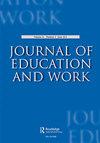Is ‘diversity’ a liability or an asset in elite labour markets? The case of graduates who have benefited from a French positive discrimination scheme
IF 1.7
Q2 EDUCATION & EDUCATIONAL RESEARCH
引用次数: 0
Abstract
ABSTRACT This article analyses the obstacles faced by graduates who benefited from a positive discrimination scheme at an elite French higher education institution. It adopts a Bourdieusian perspective enriched by research on the barriers encountered by socially mobile individuals from disadvantaged and stigmatised categories and studies the experiences of graduates who lack the economic, cultural, and social capital necessary to compete with traditional holders of elite positions and who, due to their ascribed characteristics and/or the positive discrimination label itself, are prone to self-eliminate from elite positions or be subjected to discriminatory practices. Using data collected through interviews with 42 beneficiaries of this scheme still in the early stages of their professional careers, the article shows that the graduates’ disadvantages and ways of coping with them, as well their chances of being stigmatised and reactions to this process, vary considerably. This variation can be explained by different family backgrounds and ethnoracial characteristics but also by axiological positions towards employability and social mobility, with ‘purists’ more likely to invest in increasing their technical cultural capital to make up for ‘handicaps’ and ‘players’ more likely to put forward ‘soft skills’ including, in some cases, those associated with their ‘diversity’.在精英劳动力市场,“多样性”是一种负担还是一种资产?从法国积极歧视计划中受益的毕业生案例
摘要本文分析了在法国一所精英高等教育机构接受积极歧视计划的毕业生所面临的障碍。它采用了布迪厄主义的观点,对弱势和污名化群体中的社会流动性个人所遇到的障碍进行了研究,并研究了毕业生的经历,这些毕业生缺乏与精英职位的传统持有者竞争所需的经济、文化和社会资本,由于其固有的特征和/或积极的歧视标签本身,他们容易从精英职位上自我淘汰或受到歧视性做法的影响。文章通过对42名仍处于职业生涯早期的该计划受益人的采访收集的数据显示,毕业生的劣势和应对方式,以及他们被污名化的机会和对这一过程的反应,差异很大。这种差异可以用不同的家庭背景和种族特征来解释,也可以用对就业能力和社会流动性的价值论立场来解释,“纯粹主义者”更有可能投资于增加他们的技术文化资本,以弥补“障碍”,“玩家”更有可能提出“软技能”,在某些情况下,那些与其“多样性”相关的人。
本文章由计算机程序翻译,如有差异,请以英文原文为准。
求助全文
约1分钟内获得全文
求助全文
来源期刊

Journal of Education and Work
EDUCATION & EDUCATIONAL RESEARCH-
CiteScore
2.70
自引率
14.30%
发文量
40
期刊介绍:
The Journal of Education and Work is an international forum for academic research and policy analysis which focuses on the interplay of the education and economic systems. The journal examines how knowledge, skills, values and attitudes both about and for work and employment are developed within the education system. The journal also explores the various forms of industrial training and accreditation in the economic system, including changes in the economic and industrial infrastructure which influence the type of employees required. Work in the informal economy is also included.
 求助内容:
求助内容: 应助结果提醒方式:
应助结果提醒方式:


